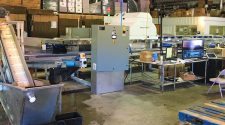A robotic arm at an industrial manufacturing factory.
kynny | iStock | Getty Images
Artificial intelligence, self-driving vehicles, medical technologies and quantum computing are areas of focus for Singapore’s early stage, state-funded investor.
While those technologies are still in their nascent stages, they are becoming more interconnected and, as a result, having a cross-disciplinary understanding of them is fundamental for investors, according to Tong Hsien-Hui, head of venture investing at SGInnovate.
“We like technologies that are inevitable,” Tong told CNBC in an interview on Tuesday, adding that investments in the so-called deep-tech space are an investment in the future.
“No one jumps into deep tech and says, ‘Hey, the technology is for here and now.’ Everyone jumps in and says, ‘I believe that this technology will be relevant and important five years from now’,” Tong said.
SGInnovate is funded wholly by the Singapore government but Tong declined to disclose the fund size. Its mandate is to invest in early-stage local, and some international, deep-tech start-ups. Unlike Temasek Holdings, which is the city-state’s investment arm, the checks that Tong and his team write are relatively small — on average, deals are worth between $350,000 and $1.5 million.
“That would be, basically, our comfort zone. We can do more, we can do less, depending on what the opportunity is,” he said.
Investing in AI and sensors
Artificial intelligence is becoming more important not just to Singapore, which has undergone rapid digitization in recent years, but to the entire Southeast Asia region, according to Tong.
Seeing AI’s potential value, investors around the world have been opening their checkbooks to start-ups. Venture capital funding of AI-related companies jumped 72% globally and hit a record $9.3 billion in 2018, a report from PwC and CB Insights said earlier this year.
SGInnovate is taking a targeted approach to the space.
“We’re not that big and we have an investment mandate that we need to show returns as well,” Tong said. “So, we said, ‘Let’s invest in sensors.’ The reason why is because sensors are going to drive everything that we do.”
Sensors are components used in a variety of new technologies including AI, robotics, data analytics, the so-called Internet of Things and self-driving vehicles. So, demand for sensors will likely always exist, which would create immediate revenue streams for such start-ups, Tong explained.
SGInnovate invested in a U.S. company called Sense Photonics, which develops sensors critical for self-driving vehicles and drones.
The reason for investing into international start-ups, according to Tong, is to help Singaporean companies learn from their counterparts in the U.S. and Europe. That not only helps them make money, but, it also validates the technologies that are being developed locally. Across Asia, AI will remain one of SGInnovate’s main investment focus, Tong added.
Medtech and quantum computing
In the medical technologies space, start-ups now increasingly compete with large consumer electronics companies that have deep pockets to facilitate research and development. Last year, Apple revealed that the Apple Watch can detect irregular heart rhythms and other problems.
SGInnovate has invested into companies developing technologies for better patient monitoring, improving medical imaging using machine learning and improving stroke prediction using AI. Still, medtech remains highly specialized and faces plenty of structural challenges including regulatory hurdles, passing clinical trials and convincing hospitals and other health-care providers to buy into the new technologies, according to Tong.
Another avenue: Quantum computing. The tech is theoretically able to store more information than classical computing, can perform certain functions millions of times faster and can solve existing challenges in areas such as cybersecurity and space exploration. The technology is both new and expensive, however, which makes it harder for investors to gauge the kind of returns they may see.
For Tong, it’s a 10 to 15-year bet.
“For quantum, when we put the money in, we cannot look at the horizon where the technology matures,” he said. “We’ve got to look at the intermediate step where we see consolidation in the market. We will probably start to see consolidation once the specific hardware configuration stabilizes.”
Exits
The success of homegrown companies in Southeast Asia, such as Singapore-headquartered Grab and Indonesia’s Gojek, has created opportunities for many start-ups in the region, according to Tong.
Those companies, he said, have realized that mergers and acquisitions present attractive opportunities for quicker growth. For investors, that means potentially seeing quicker returns on their investments instead of having to wait for the start-ups to go public.
Earlier this year, Gojek bought a Philippines-based financial technology start-up, Coins.ph, for a reported $72 million.

















